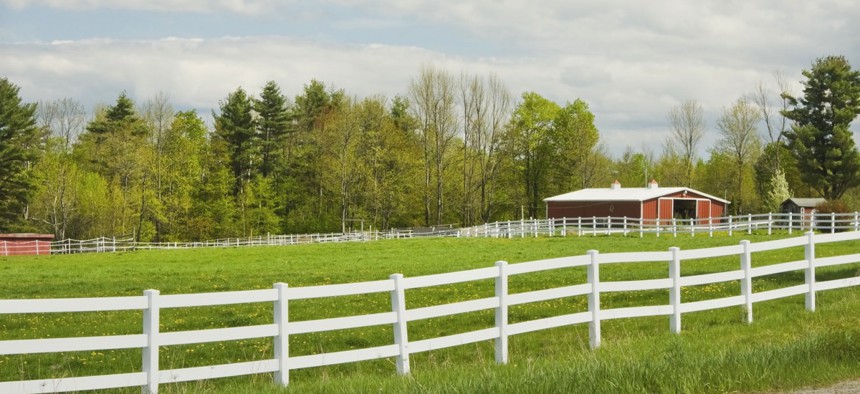Connecting state and local government leaders
Encouraging trends offer hope that the region can produce much more of the food it consumes.
NORTHEAST HARBOR, Maine — On a bright morning in early August, scores of shoppers gathered on the harborside village green here, coming to buy the just-picked vegetables and flowers, the just-slaughtered pork, the freshly made artisanal cheeses and other goods produced on local Maine farms.
Much earlier that morning, Dylan Brown had made the two-hour trek down from his Dilly Bean Farm in Newburgh, bringing fresh peas, Swiss chard, kale, squash, cucumbers and sparkling lettuces to show off and sell to the summer crowd in this popular summer getaway.
Most of the summer folk who bought Dilly Bean’s produce probably didn’t know it, but their dollars were supporting an interesting renaissance in farming in Maine, one that has the potential to lead a revival that could dramatically alter the pattern of food-buying in New England and even the rest of the country.
Most Americans don’t pay much attention to the sources of their food. If they bother to conjure up an image of a farm, it’s often a sprawling operation owned by giant agribusiness interests raising chicken, cows, pigs and even produce at industrial scale. The small, family farm is seen as a thing of the past.
But in Maine, young farmers like Dylan Brown are bringing the small farm back, riding the wave of consumers’ changing tastes and their willingness to pay more for locally produced, fresh and safe farm goods than for mass-produced meat and produce from faraway places in America and beyond the seas.
Leading the Way
Leading the renaissance is a passionate advocate of Maine farming, John F. Piotti, who is president and chief executive officer of the Maine Farmland Trust. Piotti has engineering, public policy and management degrees from the Massachusetts Institute of Technology and served eight years in the Maine House of Representatives.
He has put these educational and political credentials behind a single-minded effort to bring renewed economic prospects to rural communities. He grew up on remote Nantucket Island, 30 miles distant from Massachusetts’ Cape Cod, the youngest of five children and the stepson of a fisherman who taught him a love of land and sea. Nantucket was changing in the ’70s and ’80s, while Piotti was at the Massachusetts Institute of Technology, as wealthy people bought up land, erected large beach houses, patronized fancy new restaurants and golf courses, changing the island from rural to chic and land prices from low to high.
“So I came to realize I could never go back,” said Piotti in an interview. “There were few if any opportunities for local people, no professional opportunities.” As he saw it, “rural communities were either going to wither on the vine, or become hip, trendy and overpriced.” He was deeply disturbed by the dichotomy and resolved that he would work to change it. “So it became the focus of my life,” he said. “I wanted to crack that nut.”
Piotti moved to Maine, where two of his sisters already were living, and resolved to put his technology skills to work in helping small businesses—a metal-working shop, wood processors and the like. “But then a farmer challenged me, saying that you can’t make rural places more vital if you don’t also focus on farming,” Piotti said. He’d been of the view, common even then, 25 years ago, that farming had become a business of the past.
But he was working for a small business incubator, Coastal Enterprises Inc., and he asked its president if he could apply for a grant to work on promoting sustainable farming. Given the go-ahead, he helped form the Maine Farmland Project in 1995, and CEI developed a farm portfolio of loans and investments. The Maine Farmland Trust followed, starting up in 1999, with the goal of providing economic development tools for farmers. A key objective, achieved by means of easements and sometimes outright purchases, has been to keep farmland affordable to the next generation of farmers.
Along the way, Piotti was elected to Maine House, where he sought and gained the chairmanship of the Agriculture, Conservation and Forestry Committee, then chaired the Taxation Committee before being named Majority Leader by then-Speaker Hannah M. Pingree. His eight years in the legislature ended in 2010.
Encouraging Trends
The Northeast Harbor farmer’s market on Thursday mornings is one of four each summer week on Mount Desert Island, the others showing up on Fridays in Southwest Harbor and Town Hill, and on Sundays in more populous Bar Harbor, where the market operates from Memorial Day until the end of October. Scores of such markets listed on the Maine Federation of Farmers’ Markets website.
And the markets aren’t the only outlets for the small farmers’ products. Permanent stores selling meat, cheese, pies and other goods are also part of the scene, as are direct farm-to-restaurant arrangements increasingly common in Portland, Maine’s largest city, and other towns. Indeed, the “grow-local” movement has helped make Maine a “culinary destination,” Piotti says.
Hard numbers lend encouragement to the hopes of farming advocates in the Pine Tree State. The 2015 edition of the Farmland Trust’s Maine Farms tracks the trends. Farming’s potential rebirth first showed up in the Federal Agricultural Census of 1997, the journal reports. Momentum built: from 2002 to 2007, the number of farms in the state increased by nearly 1,000, to 8,136. By 2012 the value of farm production was up 24 percent over 2007, proving that the new operations weren’t dominated by hobby farmers. The number of beginning farmers jumped nearly 40 percent over the same period. Some could earn incomes that seem OK in rural America—$45,000 or more for a goat farmer, for example—and such small-scale farming offers a lifestyle that many treasure.
But, as Piotti writes, these statistics don’t capture key facets of the farming picture, with some farms struggling as others do well, and with many remaining in business only because farmers are willing to work “exceptionally hard for very little money.”

A much larger resurgence in farming is envisioned in a study released last year by a team of academic researchers led by Brian Donahue of Brandeis University. Titled “A New England Food Vision,” the paper proposes that New England seek to produce half of its food by 2060. At present, only about 9 percent of the six-state region’s food is produced locally—grown on only 5 percent of the New England’s land. A century ago, much more land was devoted to agriculture, but as farms died, the land reverted to the forests that now cover 80 percent of the region’s surface. Donahue’s goal could be achieved if the region increased its agricultural land to 15 percent, or six million acres, of the total, he projects. Most of the reclaimed land would be in Maine, as the other five states simply don’t have many acres to offer.
Maine is surprisingly hospitable to agriculture; it shares the 45th parallel with Provence in southern France and Italy’s Po Valley and has a longer growing season for certain crops than many might suspect. Piotti notes the little-known fact that the amount of sunlight received is more important than temperature in determining the growing capacity of Maine land. And farmers are finding ways to cover crops of produce during all but the coldest months, extending growing seasons.
This may seem a gauzy vision, inasmuch as most New England agricultural products aren’t price-competitive with imports from elsewhere.
But long-term economic and behavioral trends are working in its favor, Piotti hopes. One, he says, is the probability of food price increases that could make locally grown product more price-competitive. Transportation costs will increase, he believes, in part because today’s low fuel prices likely will rise as population and economic growth boost demand. Water scarcity in other regions will be a factor too; indeed, the huge Ogallala aquifer that irrigates eight Great Plains states is running dry, threatening the output of the country’s traditional breadbasket. California’s ongoing extreme drought, also, promises to reshape U.S. agriculture. (New England is blessed with plentiful water supplies.) And the federal government may change subsidy policies that artificially suppress the price of grains used on feedlots, a change that would make grass-fed livestock in New England more affordable to consumers.
Between Now and Then
In the meantime, it is not easy to keep farming healthy in Maine. It’s a critical time, since so many farmers are becoming too old to keep up the grueling life their calling entails. One third of Maine’s farms, about 2,500, will change hands in the next five to 10 years. Some farmers have sons or daughters who want to take over, but the economics of such intergenerational transfers are tricky.
“Growing Local,” a video sponsored by the Maine Farmland Trust, tells the story of the Beal family, who operate the Rocky Ridge Organic Farm in Litchfield. Richard Beal has been at his dairy and livestock operation for 38 years, and now his son Adam, with financial analytic help from his sister Amanda, is trying to assume the reins. Amanda says, “No one works as hard as my Dad; it’s the human cost to cheap food.” The father poignantly says that “the farm is my retirement; I can’t just give it to him. He has to get me out of debt and give me something to live on.”
Growing Local Trailer, 2014 HD from Agrilicious.org on Vimeo.
Where Adam will find the money is unresolved. But this is the kind of problem the Maine Farmland Trust addresses, with tools for helping people like Adam find the resources they need to keep going. The Trust works, with easements and outright purchases, to keep farmland from falling to developers, and to keep its price at transfer from rising to a level developers would pay. It also connects sellers and potential buyers with its Farmlink website. Putting a house, or a housing development, on farmland might provide a greater return on investment, Piotti observes, but farming may return a greater value to society.
It’s a tough fight. Federal policies keep the price of milk below the cost of production for farmers like Beal. It’s a capital-intensive business, and with such low margins, Beal struggles every time a piece of machinery breaks down: One more repair or sacrifice to get something newer? Finding the money to keep farms in business, let alone starting new ones, is no easy task.
“The future we want will only be realized if we take deliberate steps to protect more farmland and provide key services to farmers—and only if we do so now, while we still have the opportunity,” says Piotti.
But in the meantime, young people are starting up first-class butcher shops to process local pork, beef, lamb and chicken, and other stores to market produce, pies, flowers, handmade goods and more of farm families’ output. Farmers markets thrive, there’s the Brandeis report’s long-term vision of the future, and in talks here on Mount Desert Island this summer, Piotti expresses optimism that his long pursuit of a more prosperous rural economy may come to fruition.
Timothy B. Clark is Editor at Large at Government Executive’s Route Fifty.

NEXT STORY: Mobile data system cuts the static for Frederick County fire and rescue




